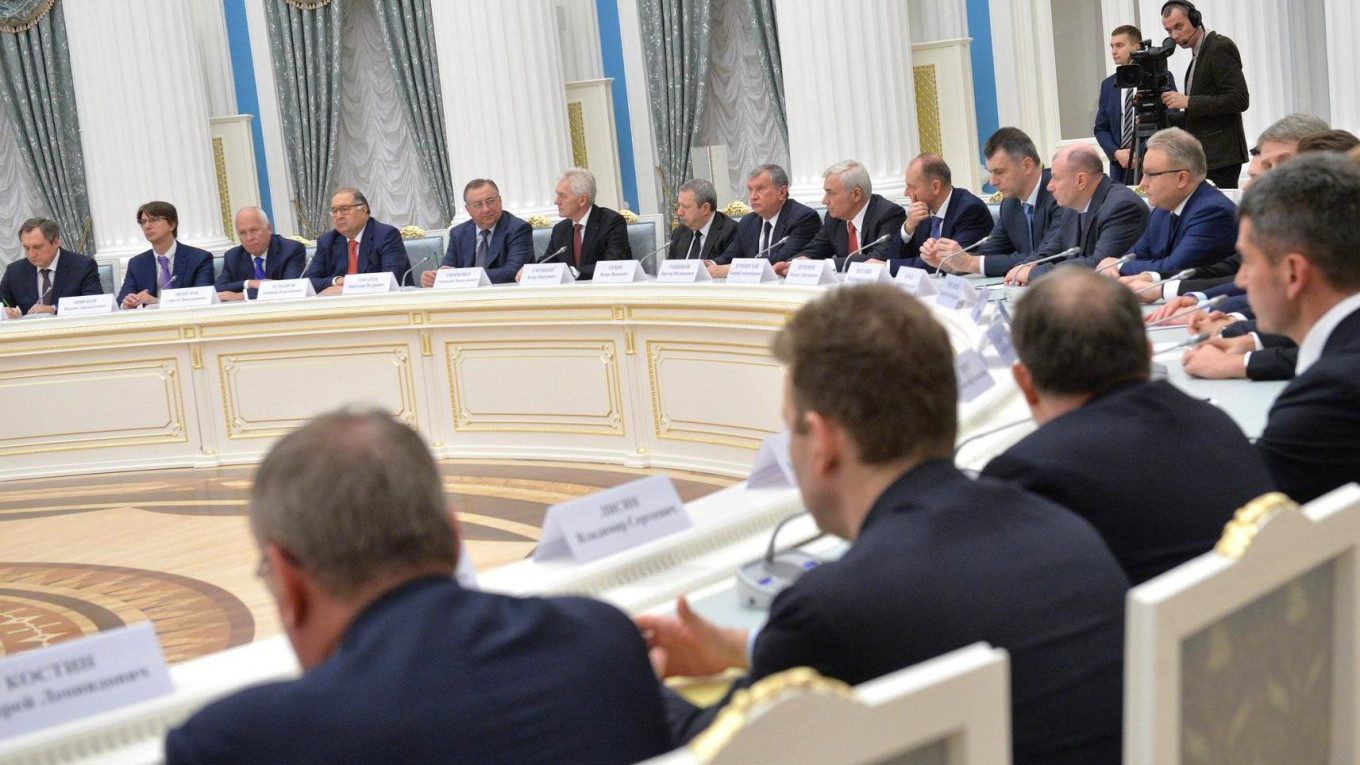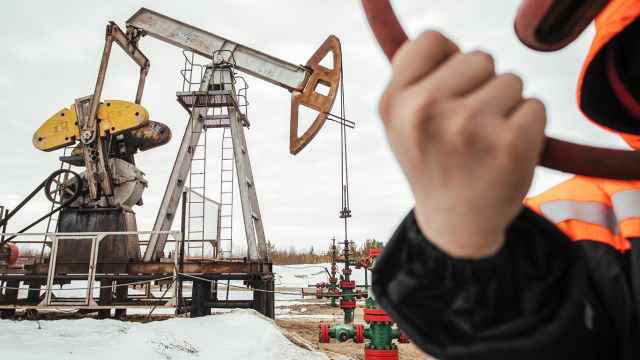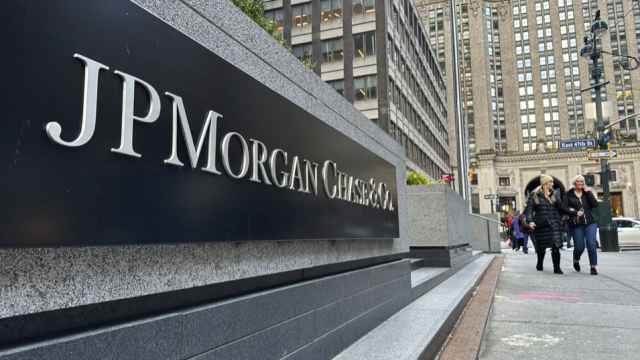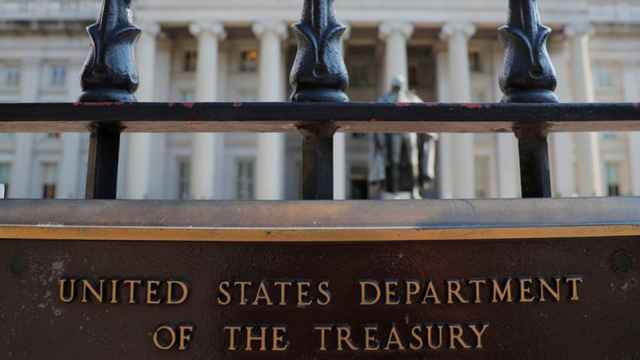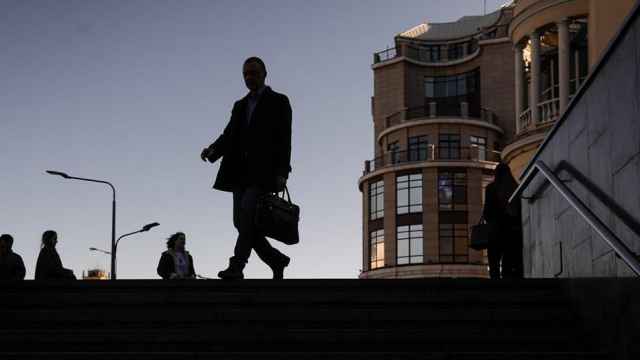The Russian members of the Forbes list are worried about the Countering America’s Adversaries Through Sanctions Act that U.S. President Donald Trump signed into law on Aug. 2, 2017. By “adversaries” it means Iran, Russia and North Korea.
The Act stipulates that the U.S. Treasury Department, Director of National Intelligence, and the Secretary of State have 180 days — that is, until approximately February 2018 — to present a detailed report on Russian “oligarchs” and senior officials involved in Russia’s foreign policy to a special committee of the U.S. Congress.
The document indicates that anyone whose name appears on the list could be targeted with personal sanctions. Such sanctions typically prohibit individuals from entering U.S. territory, freeze their assets, and ban them from doing business with U.S. citizens and companies.
Who’s at Risk?
We spoke with dozens of Russians on the Forbes list. Almost all of them were aware of this provision of the law and admitted that they were doing everything possible to keep their names off the list.
One individual said that it had been necessary to fly to Washington to get a clearer picture of the situation. But, the person said, the journey had not been fruitful.
“Nothing is clear: no one is working on these sanctions and no one is drawing up the list of who will be included,” he said, adding that even local lobbyists were unable to uncover anything more about the process.
“The sanctions will not be based on any particular criteria or sources of information.”
Although the Act does not mention any specific names, Russia’s business community agrees that metals tycoon Oleg Deripaska is most at risk.
His name has come up repeatedly with the U.S. authorities, especially concerning his communications with former Trump campaign manager Paul Manafort. Deripaska’s representatives did not respond to inquiries from journalists.
The Alfa Group headed by Mikhail Fridman is also at risk. That business is mentioned in the scandalous dossier of former British intelligence officer Christopher Steele that was published in BuzzFeed last year.
It states that the Alfa Group allegedly carried out Putin’s orders and helped interfere in U.S. elections. Alfa Group is currently suing BuzzFeed and the parties that ordered the dossier, demanding that they refute the inaccuracies it contains.
The media have often pointed to Alisher Usmanov and Roman Abramovich as the two businessmen with the closest ties to Vladimir Putin. Their representatives declined to comment.
An assistant to one Russian businessman explained that not only are the people on the Forbes Top Ten are at risk, even those whose names have appeared only a single time in medias rankings of major government contractors will have trouble sleeping easily.
During the Obama administration, Russian businesspeople could obtain answers to their sanctions-related questions from State Department sanctions policy coordinator and Atlantic Council expert Daniel Fried. However, he resigned immediately after the elections and, as of July, his post remained vacant.
“It’s unclear who to consult now,” said one Russian businessperson on the Forbes list.
Another added: “I see it this way: the Americans are telling us to take our problems to Putin and to leave them alone.”
The Russian authorities are well aware that large businesses could have problems. Approximately two years ago, President Putin gathered Russia’s major businesspeople for a meeting at which he warned them of the risk of personal sanctions, one participant of that meeting said.
Another participant said that, even then, Putin saw what was coming and issued instructions on what precautions they could take. Presidential spokesman Dmitry Peskov did not respond to journalist’s questions on the subject.
What might be in store for the oligarchs and their businesses?
According to the text of the Act that President Trump signed, by February 2018 the U.S. authorities must accomplish the following:
— Identify the circle of senior officials involved in foreign policy and oligarchs with close ties to the Russian authorities;
-
— Determine their relationship to Vladimir Putin and members of the Russian ruling elite;
-
— Determine whether those individuals are involved in corrupt actions;
-
— Estimate the amount of wealth and the sources of income of those individuals and their family members – spouses, children, parents, and brothers and sisters, including their assets, investments, and any other business interests and significant share holdings they have in any companies anywhere;
-
— Determine whether they have business relations and assets outside of Russia;
-
— Assess the potential impact imposing sanctions against these “oligarchs,” state-owned and partially state-owned companies would have on those entities themselves, and on the economies of Russia, the U.S., and U.S. allies.
-
— Determine the potential impact of imposing secondary sanctions against Russian oligarchs. (Secondary sanctions are especially odious because they carry force beyond U.S. territory. Anyone winding up on that “blacklist” would find themselves unable to obtain financing not only from U.S. banks, but also from European financial institutions.)
What are the consequences?
The imposition of sanctions against a particular businessperson does not necessarily mean that his or her entire business would be affected automatically, explained Moscow State University International Law Professor Ilya Rachkov.
However, sanctions targeting individuals and those against businesses usually go hand in hand.
In any case, any major businessperson placed on such a “blacklist” faces enormous risks. First, the U.S. and European authorities try to keep up with each other on the issue of sanctions. Second, the U.S. authorities strictly monitor compliance with secondary sanctions worldwide, and those found in violation of the rules can face heavy fines.
The U.S. Office of Foreign Assets Control (OFAC), a division of the U.S. Treasury Department, is responsible for drawing up sanctions lists. It was that same agency that, in 2014, included Gennady Timchenko, Arkady and Boris Rotenberg, and Yury Kovalchuk in its Specially Designated Nationals sanctions list based on the fact that they are “part of President Putin’s inner circle.” A number of others were added to that list later, including Rosneft head Igor Sechin.
The OFAC has almost complete authority to expand its list of restrictions independently. Here are some of the agency’s powers, extensively reported on by the RBC business outlet in 2014;
— The agency can freeze assets in U.S. accounts, limit access by foreigners and foreign organizations to the U.S. financial system, and prohibit U.S. banks from cooperating with any financial institution in the world;
-
— There are serious fines for those who circumvent the agency’s sanctions;
-
— Once an individual or organization is “blacklisted” by the OFAC, it is extremely difficult to undo. There is no clearly defined mechanism for challenging such a decision and the OFAC has the right simply to ignore such complaints.
-
— In February 2011, the OFAC needed only 72 hours to freeze former Libyan leader Muammar Gaddafi’s U.S. account holding $30 billion.
Preparing for sanctions
“This is not something you can prepare for,” sighed one Russian member of the Forbes list, although several other businesspeople said they were working closely with their lawyers.
Law firms are even making the rounds with workshops on how to prepare for the event. However, at least one person who has attended such sessions reports that the lawyers have nothing to offer that could be of any comfort. Their best advice is for businessmen to divorce their wives and register all their assets in the names of their former spouses.
The most high-profile example of this is the divorce of Roman Abramovich and Daria Zhukova. The pair made an official announcement of the move on Aug. 7, just five days after the signing of the U.S. law, but sources close to Abramovich claim that the couple had made the decision much earlier.
It recently emerged that Oleg Deripaska’s wife, Polina, became the owner this month of an almost 7-percent share of Deripaska’s En+ holding company – owned by UC Rusal and energy assets – valued at $500 million to $600 million. That transaction also has no connection to sanctions, according to one Deripaska associate. It remains unknown whether it was connected with the pair’s marital status, or what that status is.
Businesspeople also have the option of selling off their assets, as Onexim owner Mikhail Prokhorov has been doing since last year. He sold a seven-percent stake in UC RusAl in August — eight days after Trump signed the sanctions act — and recently decided to prune it back a little more. Prokhorov did not respond to a request for comment.
Is there a chance sanctions will not be applied?
Last week, Trump began designating various government agencies and executive bodies to implement the law, although none has yet been charged with carrying out the provision regarding oligarchs.
Two senators – Ben Cardin and John McCain – simultaneously appealed to Trump and his administration to “implement the law to the full extent.”
The original Russian-language version of this article first appeared in The Bell.
A Message from The Moscow Times:
Dear readers,
We are facing unprecedented challenges. Russia's Prosecutor General's Office has designated The Moscow Times as an "undesirable" organization, criminalizing our work and putting our staff at risk of prosecution. This follows our earlier unjust labeling as a "foreign agent."
These actions are direct attempts to silence independent journalism in Russia. The authorities claim our work "discredits the decisions of the Russian leadership." We see things differently: we strive to provide accurate, unbiased reporting on Russia.
We, the journalists of The Moscow Times, refuse to be silenced. But to continue our work, we need your help.
Your support, no matter how small, makes a world of difference. If you can, please support us monthly starting from just $2. It's quick to set up, and every contribution makes a significant impact.
By supporting The Moscow Times, you're defending open, independent journalism in the face of repression. Thank you for standing with us.
Remind me later.


